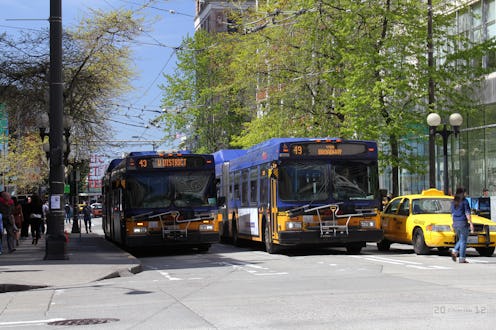News
Seattle Public Transit Bases Fares On Your Income

As food prices and the cost of living continue to skyrocket, at least one city is taking proactive measures to protect its citizens. Public transit agencies King County Metro and Sound Transit in Seattle have begun pricing fares according to passengers' income levels in response to the recent 25-cent increase that was introduced on March 1, reported Forbes on Wednesday. Families and individuals whose income is "200 percent or less" of federal poverty levels will only be required to pay around $1.50 for a bus ride through the city. Although it might seem like a small move, it's anything but.
Nationwide, income inequality is rampant. For workers who are forced to live outside the city due to high rent prices, but continue to work in the metropolitan area (that's where the majority of the jobs are, after all), commuting to work is an incontrovertible fact of life that becomes more and more difficult to cope with as the price of everything balloons. According to a report by The New York Times on Feb. 28, the new calculated fares will be handled via smart-card technology which allows the user to reload funds online and swipe them on public transit. Rates will be set ahead of time, allowing for swift boarding and exit.
According to the Times report, however, there are some qualms over the logistical and budgetary pitfalls involved in the program. Because public transit is usually backed by government subsidies, and those subsidies have been strained to a breaking point in recent days, the new reduced fare program would rely on popularity among transit riders and absolute efficiency on the business end of things. The report cited comparable programs in Green County, Ohio, and San Francisco — the latter of which still only serves 20,000 cardholders out of the nearly 350,000 who use public transport each day.
Regardless of its shortcomings, the reduced fare program currently being tested in Seattle will definitely ease the burden on a growing number of individuals who simply don't make enough to live even close to comfortable. Tukwila resident Basro Jama, a 27-year-old Somalian mother of two, told The Times that the new fares will likely save her around $10 a week on her commute into the city each day — and that's $10 she will be able to use elsewhere. "That’s like taking my kids to McDonald’s; two Happy Meals is $9," she said.
Seattle has made major leaps in recent days to quell the dramatic rise in inequality, namely raising their minimum wage to $15, which is set to take effect in April. And though some have expressed frustration at what they believe is redistribution, the reality is slightly more nuanced than that. Explained Dow Constantine, the King County executive and chairman of Sound Transit, to The Times, "I would characterize this as a safety valve." Constantine added that the program was really about helping King County's poorest citizens, pointing to the wide income disparity among its residents as reason enough to establish the program. "It’s people doing really well, and people making espresso for people who are doing really well," he said, speaking on the lack of middle class citizens.
Whether the program will become the new standard for income-based public policy nationwide is still under debate. But for now at least, citizens like Basro Jama will have one less thing to worry about.
Images: CanadianPacific/Flickr; fujin/Flickr; viriyincy/Flickr